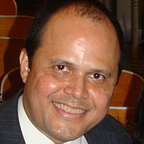Dominica — Connecting people through technology
Part of the World Food Programme (WFP)´s emergency response was to restore connectivity, one of the first casualties of Hurricane Maria.
Connecting to the internet through mobile devices nowadays is part of daily life. All telecommunications were disrupted, though, when Hurricane Maria hit Dominica last year. Besides being a lifeline for the affected communities, telecommunications were key for humanitarian workers and government officials to coordinate relief efforts.
“We had a period in which we had no communications at all.”
“We had a period in which we had no communications at all,” said Bennet Thomas, Director of Telecommunications and ICT Advisor to the Government of Dominica. “Support by the Emergency Telecommunications Cluster (ETC) was very important and critical. We are thankful for the services they have provided to communities that were cut off, particularly in remote areas.”
The ETC is a global network of organizations that work together to provide shared communications services in humanitarian emergencies. WFP leads the cluster.
Recovering the telecom services
Angel Buitrago, an Information and Technology Officer at WFP, arrived in Dominica after Maria battered the island with the mission to restore telecommunications and fly drones to assess damages.
“All infrastructure from mobile operators was completely down,” Angel said. “It was kind of going back to the Stone Age.”
Angel joined L.P. Svensson from Ericsson Response, an ETC partner, to restore connectivity at the Cane Field Airport in the capital city of Roseau and the Douglas-Charles Airport on the eastern side of the island. The team also restored internet and satellite connectivity to many remote communities. The Government of Luxembourg supported these efforts.
“Having internet on your mobile phone is a basic need,” Angel said. “If you end up without internet after a hurricane like Maria, you can’t move on with your life.”
Helping people help people!
Angel and L.P. have responded to emergencies before, but this one was different. IT specialists do not get to see what they achieve at the other end. “We assisted humanitarians, so we were helping people help people,” L.P. said.
When Dominicans realized that WiFi had been restored at the airports, they gathered at the gates. The ETC team began to register these users. Just 30, 40 or 50 seconds after turning on the phones and logging in, hundreds of messages began to pour in on their phones. Then, the first Skype and WhatsApp calls came in, as did the news that the house was gone but relatives were fine.
The ETC supported more than 2,900 users and 50 humanitarian and government agencies in 18 sites after Hurricane Maria hit Dominica.
“It becomes emotional; you feel warm inside,” L.P. said. “Not everyone has good news to send out to their relatives, but at least those people outside don’t have to live in uncertainty anymore. That is what communications is all about.”
Angel remembers vividly people crying when they connected with their loved ones after two weeks of complete black out. “We see communications as something very simple, but, in this context, it is very important.”
He recalls the case of a government official who was uncooperative with the ETC team. Her attitude changed after Angel and L.P. helped her connect her mobile to the network. “She became a completely different person because she was sending messages to people and talking to her family,” Angel said.
Gabriela Alvarado, WFP Regional IT Officer, feels the extra hours and effort while away from home and family are worthwhile when she sees the impact her work has on people. “When you are closer to the ground, that is when it impacts you, and you feel you really make a difference,” she said.
Six months later…
Telecommunications services on the island are recovering. The emergency phase of the operation has ended, and the ETC handed over to the Government of Dominica the hardware it installed in several schools, health centres and police stations in communities hard hit by the hurricane.
In late March 2018, the ETC organized a workshop in Roseau with the participation of WFP, Ericsson Response, Google and Facebook. IT specialists from the Government of Dominica, UN agencies and the private sector learned about new technologies, especially the use of drones and solar panels in emergency preparedness and response.
Emergency preparedness
“Research shows that every dollar invested in preparedness outweighs the dollar invested in response,” said Salma Farouque, ETC Preparedness and Resilience Officer, who has worked in emergencies in the Middle East.
She added that understanding who is who on the ground, prepositioning equipment and having basic plans in place are the little things that, done beforehand, will have a multiplier effect when all actors are trying to respond to an emergency.
“From the telecommunications point of view, we talk about networks, but what is really important is to establish the human network,” Salma said.
Read more stories about WFP’s work in Dominica.
